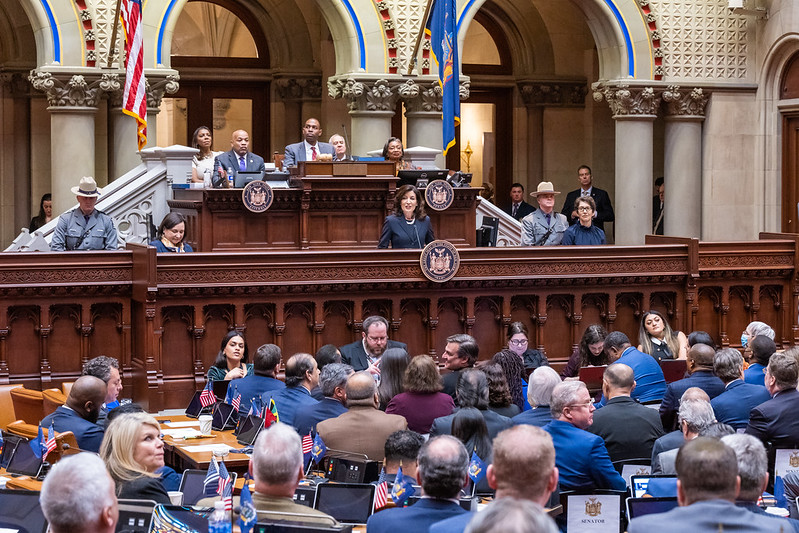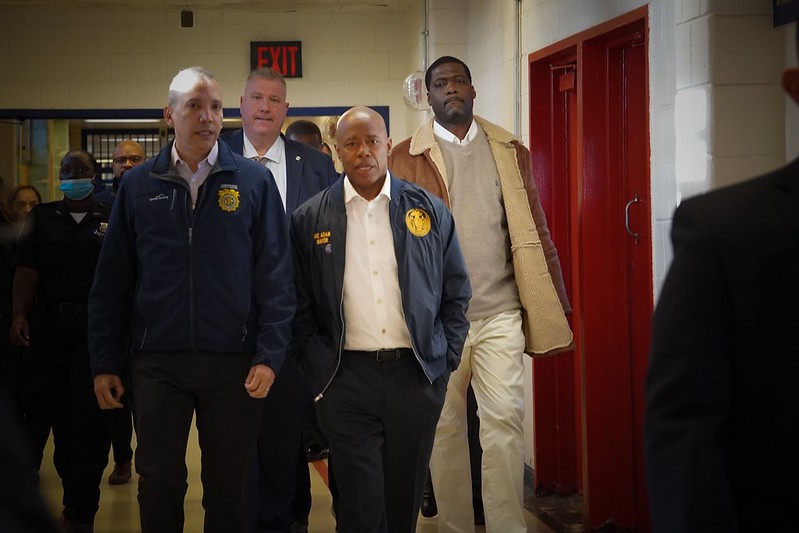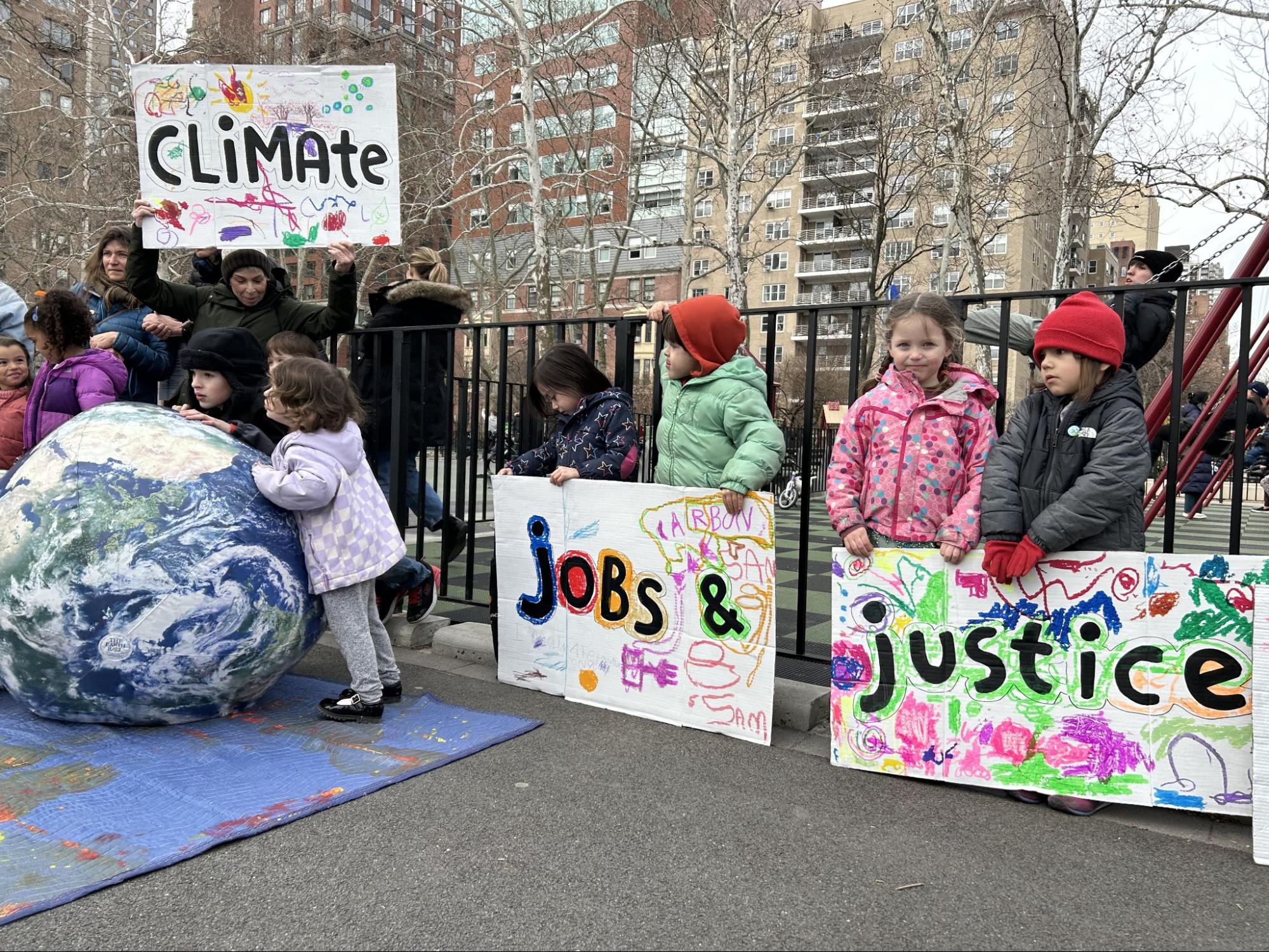Getting to a Deal on the Housing Compact New York Needs

Gov. Hochul addresses the state (photo: Darren McGee/Governor's Office)
Policymakers in Albany sent a clear message to their constituents last week: we are not serious about solving the housing shortage that is driving rents up, causing extreme housing insecurity, and keeping our communities segregated. The housing growth strategy outlined in both the Senate and Assembly one-house budget resolutions is a weak, incentive-driven approach that replicates housing policies that have been tried and failed. Localities that want to remain exclusionary and not add housing can still opt out. It’s all carrots and no sticks. There is not even a data collection requirement.
This isn’t a plan. It’s cowardly cover for inaction in a state with a severe housing crisis.
The Legislature’s budget response serves as an ill-timed repudiation of the well-researched, well-informed Housing Compact plan put forth by Governor Kathy Hochul to end New York’s crisis – a serious and realistic plan with policies that work – and could signal a major missed opportunity for the Empire State.
The good news is that there is still time to negotiate and come to an agreement that meets the moment, or at least meets in the middle. The reason I am still optimistic is that every single legislator that I’ve met – Republicans and Democrats from rural, suburban, and urban districts – all agree that we have a desperate housing crisis and that something needs to be done. While I am concerned that the excuses that I hear each time I meet with legislators on the Housing Compact might win the day, there are a handful of points for negotiation that have come out of these many meetings that are worth exploring.
Often, legislators start with the lack of infrastructure and planning capabilities in the communities they represent, claiming an inability to support housing at the necessary scale due to pressure on traffic, schools, and sewers. While the Housing Compact has funding for infrastructure improvements ($250 million) and planning ($20 million) capability, I would agree that these sums are inadequate to support a growth strategy to add more zoning capacity for housing across the state over the next decade.
This is the first place for negotiations: doubling incentives, as proposed by the Legislature with the $500 million infrastructure fund in each house’s budget resolution..
Critics also claim that the Housing Compact does not adequately prioritize affordability and will only produce luxury housing. To be clear, though, it is not an affordable housing plan – that was accomplished last year – but rather a much-needed housing supply plan.
But it does prioritize affordable housing by counting it at two times market-rate production for a community to reach growth targets. It also incentivizes affordable housing production with a tax abatement outside of New York City. And by adding density in communities dominated by single-family zoning, New Yorkers will have many more housing options than they do now – at lower price points than they otherwise would. The New York Housing Conference recently analyzed Zillow data to show that condos/co-ops are up to 40% less expensive than single-family homes in the New York City suburbs.
Affordability can be another point for compromise, whether it is in how growth is measured, where growth is encouraged, or incentives for creating new affordable homes. Both the Senate and the Assembly budget plans offer ideas on this.
Others allege that the density requirements in the governor’s transit-oriented development (TOD) proposal are a threat to areas dominated by single-family housing. While there are plenty of examples of developments that already exceed the proposed density levels right now, alternative minimum density requirements as proposed by the Senate should be considered too. Ultimately, striking a TOD deal will benefit the MTA, make New York greener, and create more multifamily housing – all while desegregating many downstate communities.
Some claim there is nowhere to build, but this is not true. As a region, data shows New York suburbs lag far behind other states – Long Island added just 7 new housing units per 1,000 residents from 2012-2022 and the Lower Hudson Valley added just 13 units per 1,000 residents. The New Jersey suburbs, by contrast, added 35 units per 1,000 residents; Virginia’s suburbs added 39 units. It can be done.
There are a plethora of empty parking lots and innovative adaptive reuses of shopping malls, factories, and apartments that all represent opportunities. But for communities that did recently build new housing, they should have a longer look-back period to credit them for efforts and not be penalized with a higher growth goal. This is an easy fix.
On the issue of local control and the desire to maintain planning power, I would argue that the state does not want to control zoning but rather achieve local participation. Communities still decide where to put more housing, what it should look like, how it will best fit in with public spaces, and existing housing, and meet economic development goals.
However, if communities choose to take no action, then under the governor’s plan the new State appeals board may approve a development that was previously denied. That’s not an ideal outcome, but it reflects the nature of our housing crisis: we’re at a point where such action is the only way to ensure every community does its part. Without this “stick,” there is no plan – and it is where Governor Hochul needs to draw the line.
Still, there are plenty of ways to soften this approach. Negotiators could consider a longer compliance ramp, designation of additional exclusions from growth targets, or easing requirements around preferred actions.
Our world is changing, and updating outdated zoning offers an opportunity for the built environment to be responsive to how we want to work, shop, and live today. And it gets to the core of the affordability crisis: a supply shortage. Governor Hochul has put forth a real plan to solve that real problem with real solutions that work in the real world. Now, all that’s left is coming together on a version the Legislature can agree to.
And what will happen if they reach an agreement? We will create a more affordable, sustainable, and prosperous New York for ourselves and our children. Is there really any excuse to prevent that future?
***
Rachel Fee is Executive Director of the New York Housing Conference. On Twitter @RachelFee4NY & @TheNYHC.
***
Have an op-ed idea or submission for Gotham Gazette? Email This email address is being protected from spambots. You need JavaScript enabled to view it.
To Close Rikers, The City Council Must Correct the Department of Correction

Mayor Adams & DOC Commissioner Molina on Rikers Island (photo: Benny Polatseck/Mayor's Office)
On Thursday, Speaker Adrienne Adams will chair a City Council hearing where leadership of the city’s Department of Correction (DOC) will share budget priorities. What may be perceived as a routine hearing impacts the future of thousands of New Yorkers currently suffering on Rikers Island and others who will be sent there.
DOC holds the lives of over 6,000 New Yorkers in its hands, and yet it has shown a brazen disregard for their well-being as well as the City Council’s oversight. If left unchecked, DOC’s actions will lead to more suffering and death. Lawmakers must make sure this year’s city budget brings us closer to, not further from, closing Rikers.
Since Commissioner Louis Molina started, DOC has gleefully and flagrantly ignored any oversight of its authority on a scale that is difficult to comprehend.
In January, the Board of Correction (BOC), which oversees DOC’s compliance with city policy, announced that DOC had revoked the Board’s right to independently view video surveillance of city jails in real time. BOC must now submit a request, subject to DOC’s approval. This blatantly undermines the Board’s oversight as authorized by the City Charter, while further obscuring the suffering of people in DOC custody.
Later that same month at a City Council hearing, Commissioner Molina refused to acknowledge the agency’s failure to protect the safety and lives of trans and gender expansive people in its custody, despite extensive and damning documentation by a Council Task Force and the media. Under questioning, Commissioner Molina not only revealed a stunning ignorance of how his agency operates, but embodied its indifference by refusing to stay and listen to the testimony of trans and gender expansive people who suffered unspeakable harm in DOC custody.
In that same vein, at another City Council hearing in February, Immigration Committee Chair Shahana Hanif confronted DOC with email evidence that the agency was transferring New Yorkers from Rikers Island into ICE custody without a judicial warrant, violating city laws barring such cooperation. The emails also revealed a pervasive anti-immigrant culture deep within DOC, with officers like Rikers Island Captain Deshan Rainey signing off emails to ICE with the hashtag“#teamsendthemback,” referring to ICE cooperation and deportation.
When confronted with questions about how New Yorkers could trust DOC to protect immigrant New Yorkers, DOC’s General Counsel Paul Shecthman sneered at the Council, insisting that a policy memo in 2019 had meaningfully changed DOC culture. The response was shocking, especially when advocates testified about ongoing violations as recently as 2022. It was also insulting, as if an internal memo restating the law would suddenly make Captain Rainey, who still supervises DOC staff on Rikers Island, reconsider how she communicates with ICE or treats people in her care.
Sensing Mayor Adams’ tacit approval of DOC’s actions, people who are formerly incarcerated and their family members have been steadfastly attending every BOC meeting to stop DOC’s attempts to thwart accountability, while keeping a public spotlight on the daily harm that goes unnoticed. Thanks to their persistence, BOC just rejected DOC’s plan to ban physical mail and packages at Rikers Island. But it shouldn’t fall to everyday New Yorkers to hold DOC accountable.
City lawmakers must stand up to DOC and show that it cannot continue to act with impunity. In her State of the City address, Speaker Adams affirmed that Rikers Island must close by 2027, as is the law. Mayor Adams’ and Commissioner Molina’s public doubts about meeting this legally-mandated obligation is simply one more tactic of evasion, and the City Council must not fall for it.
Instead, the Council should use every budgetary and legislative tool at its disposal to close Rikers Island – now. This includes pending legislation to further decarcerate city jails and prevent New Yorkers from entering the system in the first place.
Majority Leader Keith Powers’ and Council Member Hanif’s detainer law package would, among other things, create a private right of action to hold DOC accountable if a New Yorker thinks they were detained and transferred to ICE unlawfully. While the Public Advocate has a bill with majority Council support to finally and completely end the practice of solitary confinement. Passing both bills, while publicly supporting state legislation like the New York For All Act, would send a clear message that deliberately flouting state and city law will not be tolerated and there is a better vision for safety and justice.
The Council must also hold Mayor Adams to his promise of investing in resources that actually strengthen communities. Foremost is bolstering the reentry hotel program established at the start of the pandemic, which was incredibly successful in getting New Yorkers out of jail and into housing with medical and mental health care. At a time when the mayor says he is looking for solutions, expanding this type of rapid reentry housing, in addition to transitional housing slated for the summer, will quickly decarcerate Rikers and give New Yorkers a proven and dignified path to recovery.
These measures, while necessary, are the bare minimum. The only way to ensure there is not one more death, one more deportation, or one more violation of people’s rights inside Rikers is for Rikers to cease to exist. The City Council must hold fast to this north star, and do everything in the meantime to protect those who must endure DOC’s cruelty.
***
Rosa Cohen-Cruz is Immigration Policy Director at The Bronx Defenders. Julia Solomons is Senior Policy Social Worker at The Bronx Defenders. On Twitter @BronxDefenders.
***
Have an op-ed idea or submission for Gotham Gazette? Email This email address is being protected from spambots. You need JavaScript enabled to view it.
New York Families Demand A Climate Budget

Rallying for Climate Justice (photo: Chandra Bocci)
We write this on behalf of parents, grandparents, aunts, uncles, educators, and caregivers deeply concerned for our children’s futures. Over the next few weeks, Governor Hochul, Senate Majority Leader Andrea Stewart-Cousins, and Assembly Speaker Carl Heastie will finalize the state budget for the upcoming fiscal year. When they do, they must remember their littlest constituents and include the full NY Renews Climate, Jobs, and Justice Package to ensure our children, and all New Yorkers, have a chance at a safe, healthy, secure future.
Climate change is already taking a harrowing toll on frontline communities across New York State. From flooding in low-lying areas to extreme heat in the summers to crop disruption and beyond, it’s clear we’re in a crisis. And our children – particularly Black, Latino, Asian, immigrant, and Indigenous children – bear the brunt of fossil fuel pollution; dirty air puts them at greater risk of preterm birth, asthma, cancer, reduced cognitive ability, and more.
But despite the fact that an overwhelming majority of New Yorkers support climate action – the Environmental Bond Act passed in November with close to 70% of the vote statewide – New York is failing to meet its own climate commitments. The Climate Leadership and Community Protection Act (CLCPA) passed in 2019, almost four years ago, and set ambitious targets for emissions reductions and investment in both renewable energy and climate resiliency. Today’s kindergarteners were babies when the bill first passed. But while our children have progressed, the state has stalled — the law is still not fully funded, and the state is falling behind in its transition to clean energy. Our leaders must act now to ensure this year’s budget fully funds and implements the CLCPA.
It is also past time for the state to invest in publicly-owned renewable energy, hold polluters accountable, and tax the ultra wealthy to fund climate justice. The climate crisis is rapidly accelerating – so too must our state’s plans to shift off of fossil fuels and invest in community based resiliency and mitigation. Publicly-owned renewables will enable New York to quickly make clean energy available to more and more New Yorkers.
Meanwhile, we now know that corporate polluters – and their funders on Wall Street – have continued to expand fossil fuel infrastructure for decades despite being fully aware of the consequences for people and the planet. They must be held accountable. The Climate Change Superfund Act would make New York’s worst polluters, the major oil companies, pay for the damage they have done to our communities. This would generate $75 billion in revenue over the next 25 years for investment in community climate programs.
The budget must also include taxes on corporations and New York’s ultra-rich. New York is the most unequal state in the country, and New York City is home to more millionaires and billionaires than any other city in the world. While working parents and caregivers have struggled to stay afloat through three years of a pandemic and disrupted access to school and daycare, corporations – including fossil fuel companies – have raked in record profits. There is no excuse for failing to fund climate justice programs and a clean energy transition when New York is awash in wealth. The Invest in Our New York legislative package will ensure that the ultra-wealthy pay their fair share after years of tax breaks and kickbacks.
As people who spend our days caring for and worrying about children, we are counting on Democratic leadership’s tenacity, foresight, and commitment to this vital endeavor. It’s time to pass the Climate, Jobs, and Justice package in full. Before it’s too late.
***
Senator Robert Jackson represents District 31 in the New York State Senate, and is a parent of three and grandfather of two. Liat Olenick is a leader of Climate Families NYC, a teacher, and a parent. Laurel Tumarkin sits on the steering committee of the NY Renews climate coalition and is a parent. On Twitter @RJackson_NYC, @Liat_RO, @LaurelTumarkin, @ClimateFamsNYC, @NYRenews.
***
Have an op-ed idea or submission for Gotham Gazette? Email This email address is being protected from spambots. You need JavaScript enabled to view it.




